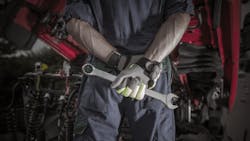When it comes to fuel efficiency specs, trust the engineers
I’ve been seeing announcements from truck makers about certain models of their vehicles that are now being spec’d for maximum fuel efficiency. These models not only have fuel efficient engines, but also tend to be spec’d with automated manual transmissions and a variety of aerodynamic devices.
The OEMs seem to be constantly modifying standard components on trucks versus optional components with a goal of making trucks more fuel efficient while also lowering the total cost of ownership.
Of course, no two fleets have the exact same needs, and there is no one-size-fits-all truck spec that will work for every fleet. But given the fact that truck makers are continually tweaking vehicle specs, it makes sense for fleets to review specs every time they order new vehicles. I know it can be tempting—especially if fuel economy numbers seem to be good—to just order new trucks spec’d with the same spec as the last order. It is the “if it ain’t broke don't fix it” adage.
But given the work the engineering teams at truck manufacturers are doing to continue to push the fuel economy and durability envelopes, I think it is better to look at a spec review as a chance to make what is already good even better.
I also know that some standard specs still have a delete option on them that allows a fleet to remove a component from the spec—sometimes with a delete credit. I suggest that before deleting an item that is part of the standard spec, the fleet manager talks with the OEM to make sure they understand all the implications of deleting a standard part of a model’s spec. Working hand-in-hand with their OEM partners, fleets can get trucks that will achieve the best MPG for their duty cycles while being durable and reliable.
Maybe I am a bit biased given that I am an engineer, but I think the OEMs have some very smart folks working for them who are focusing on optimizing some models for fuel efficiency. The specs they develop look at the truck as a complete system that is fine-tuned to work together for optimal results.
Go ahead, ask all the questions you want about a vehicle’s spec, but know that it is also okay to trust an engineer. They really do want to design the best trucks possible, and most of us are really nice, friendly people who will be happy to explain why we did what we did, but you might need to block out a lot of time.
Michael Roeth has worked in the commercial vehicle industry for nearly 30 years, most recently as executive director of the North American Council for Freight Efficiency. He currently serves on the second National Academy of Sciences Committee on Technologies and Approaches for Reducing the Fuel Consumption of Medium and Heavy-Duty Vehicles and has held various positions in engineering, quality, sales and plant management with Navistar and Behr/Cummins.
About the Author

Michael Roeth
Executive Director
Michael Roeth is the executive director of the North American Council for Freight Efficiency. He serves on the second National Academy of Sciences Committee on Technologies and Approaches for Reducing the Fuel Consumption of Medium and Heavy-Duty Vehicles and has held various positions with Navistar and Behr/Cummins.
